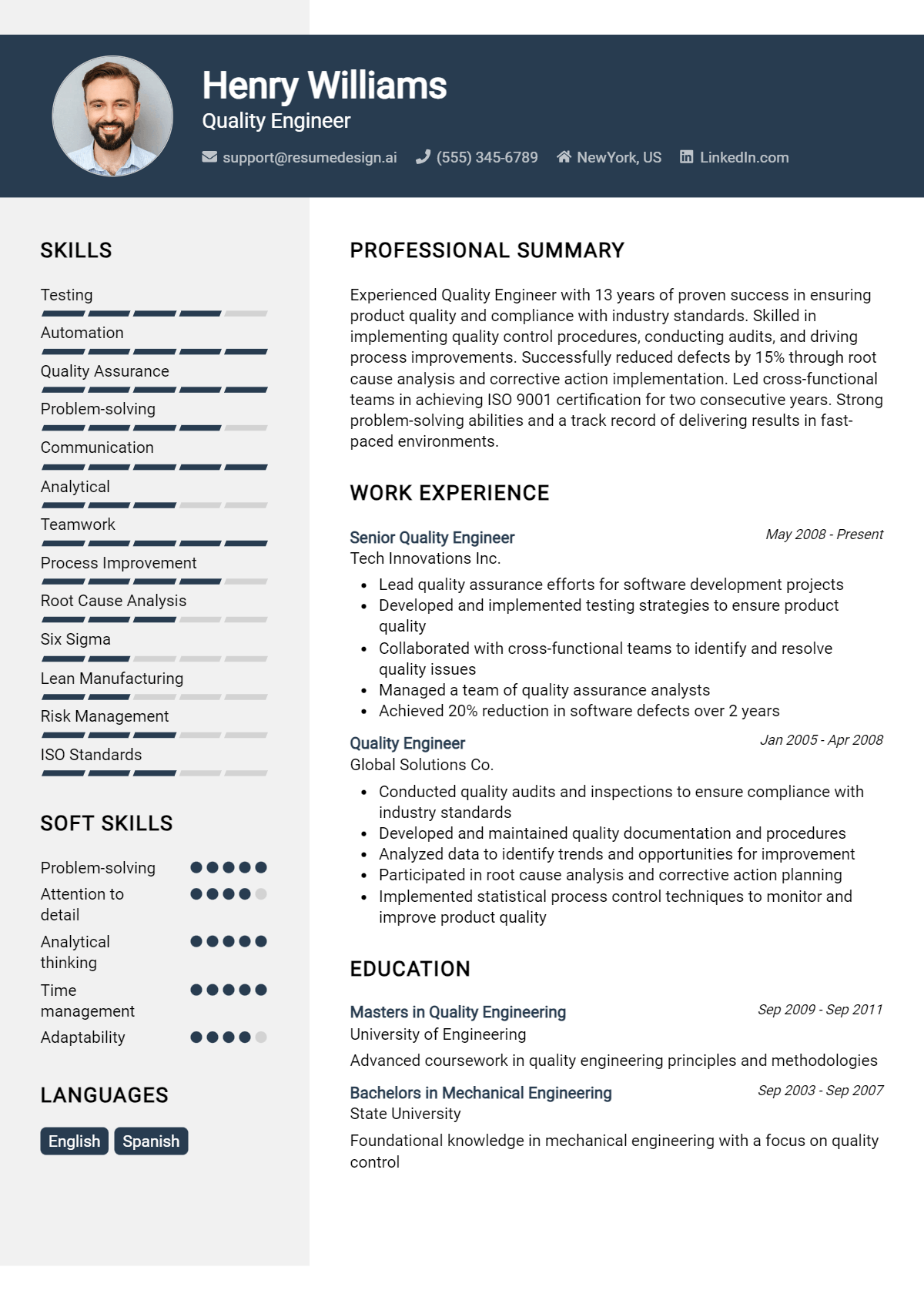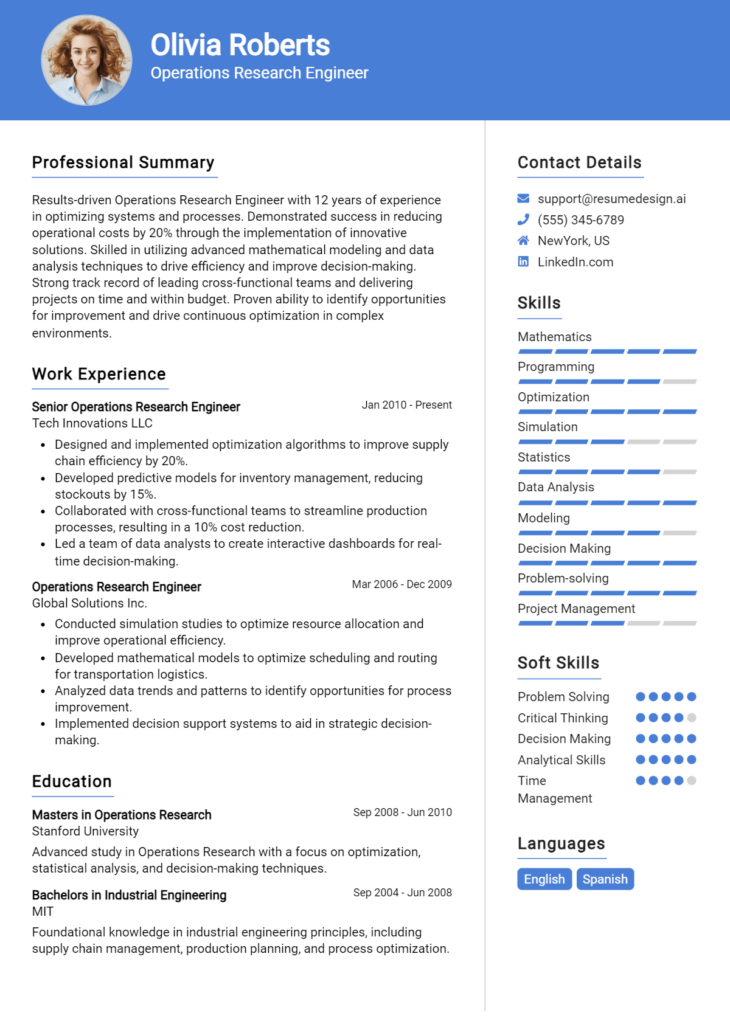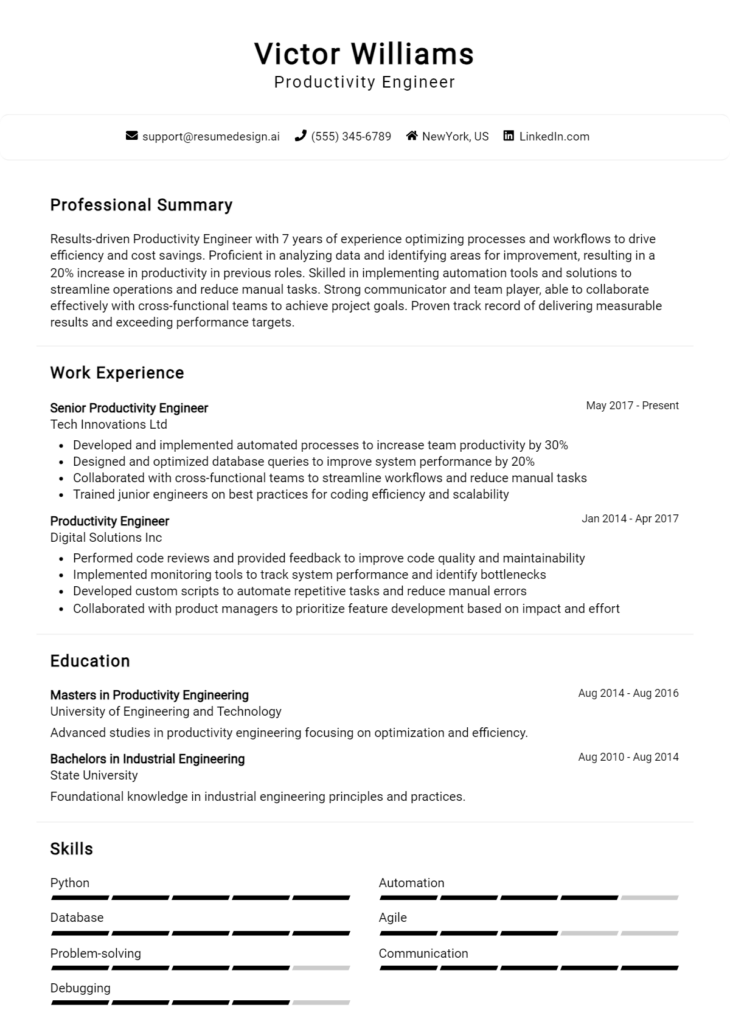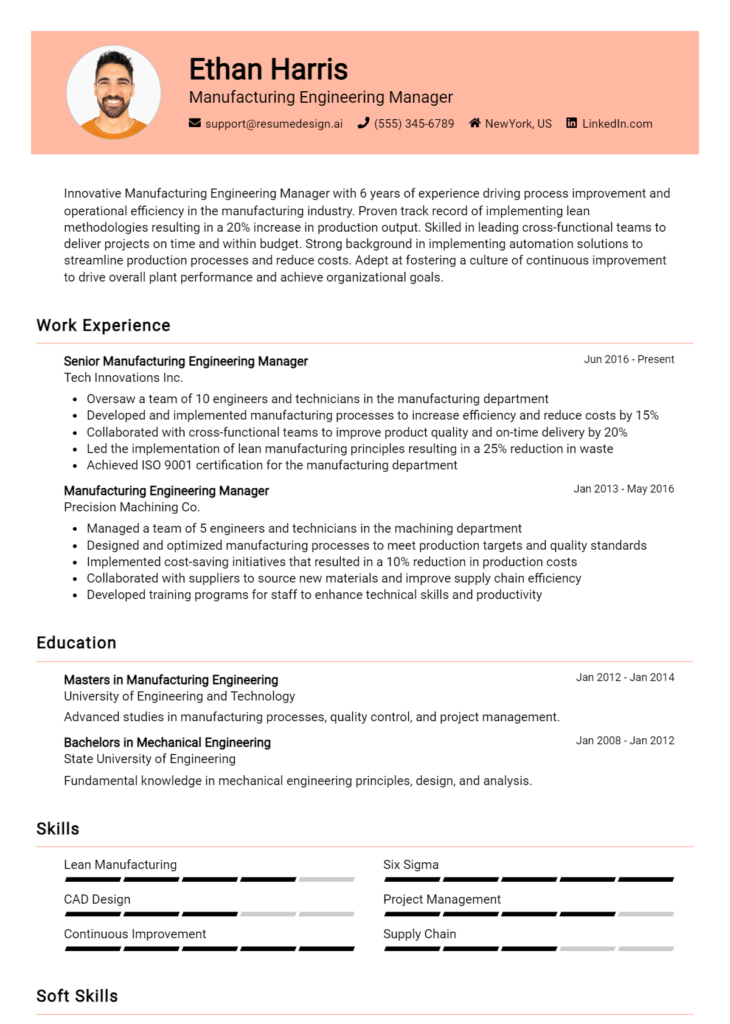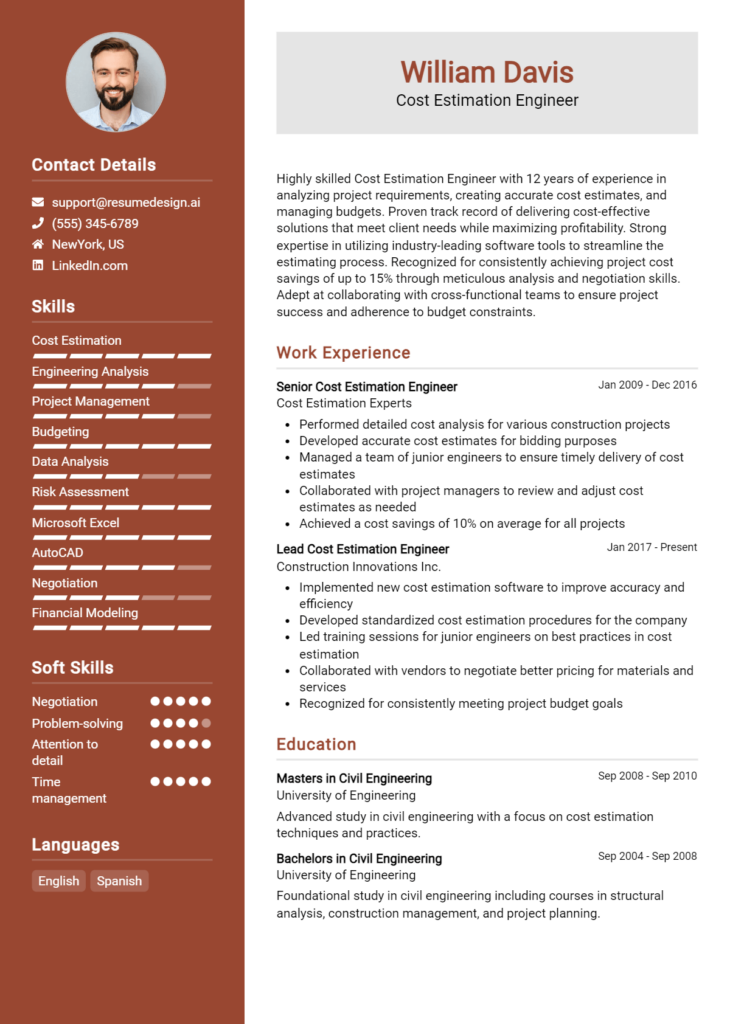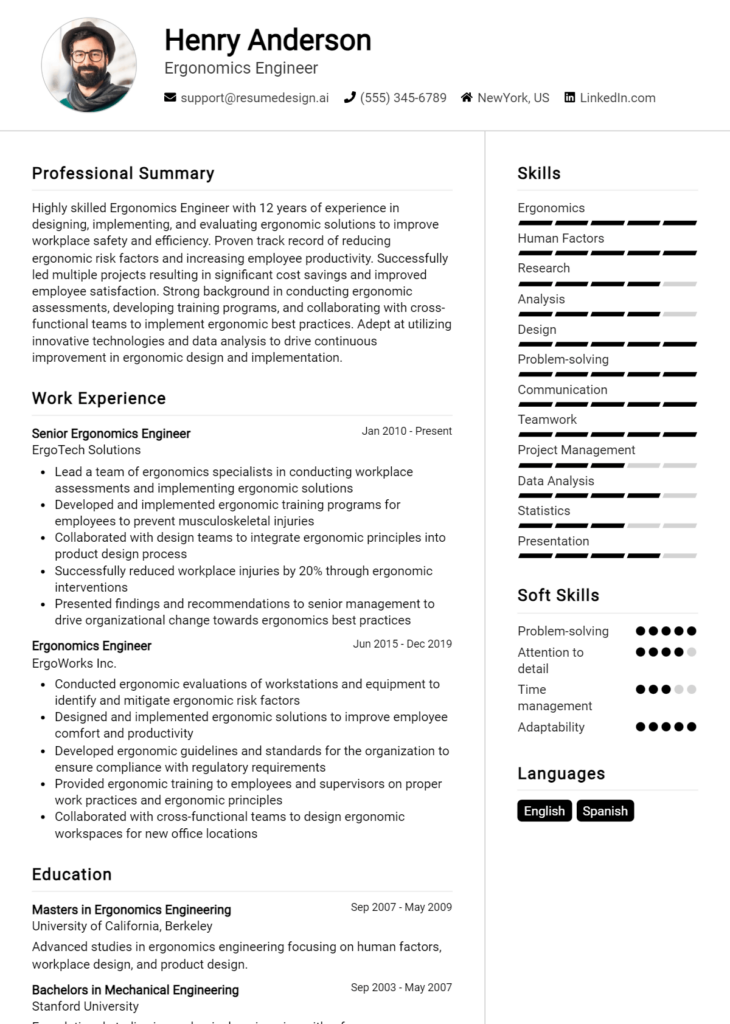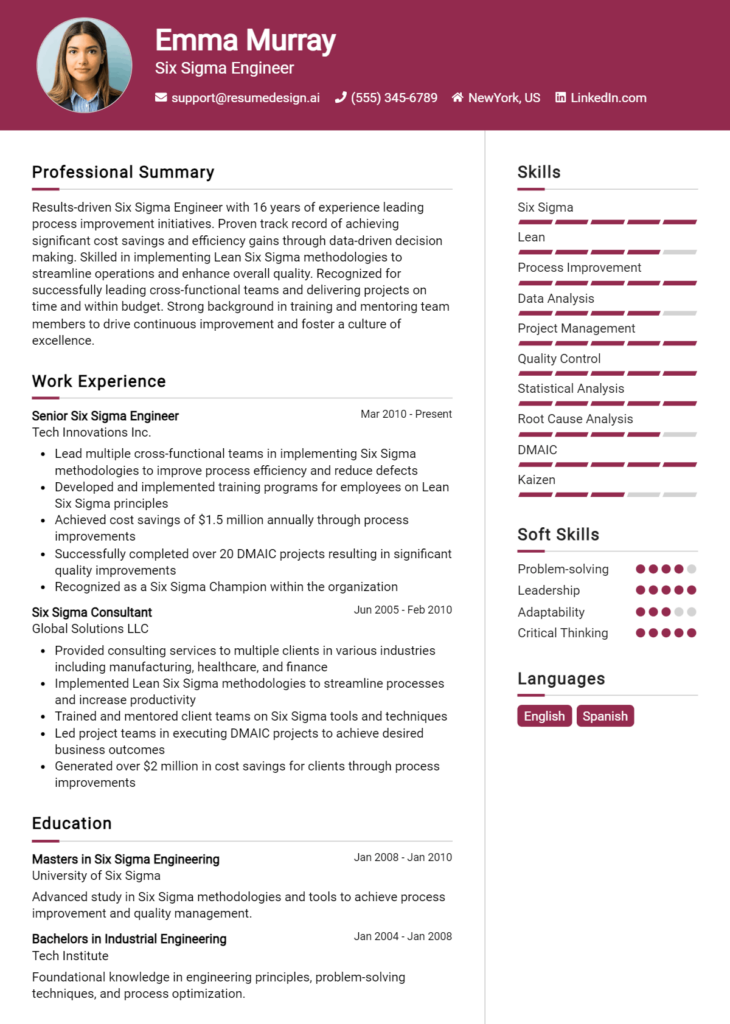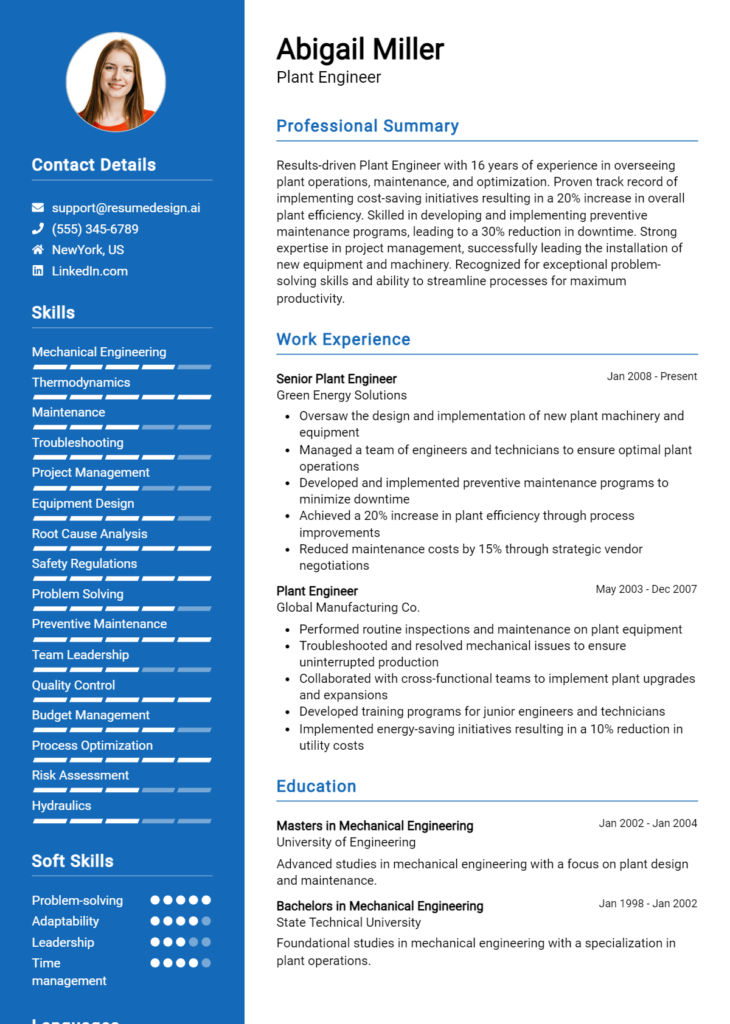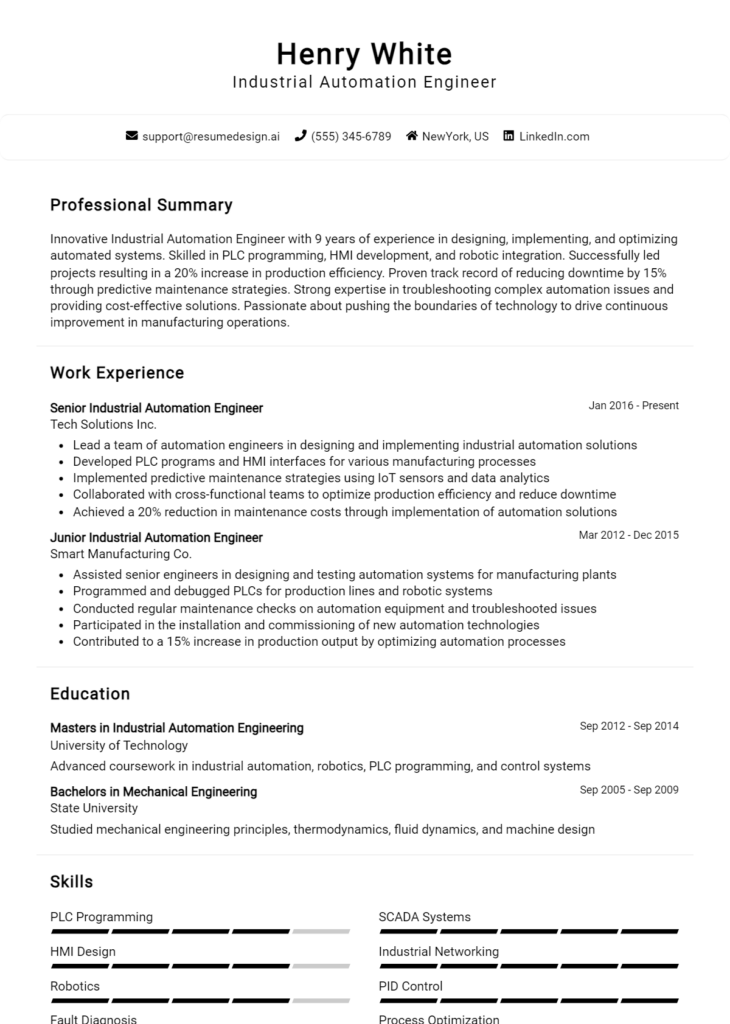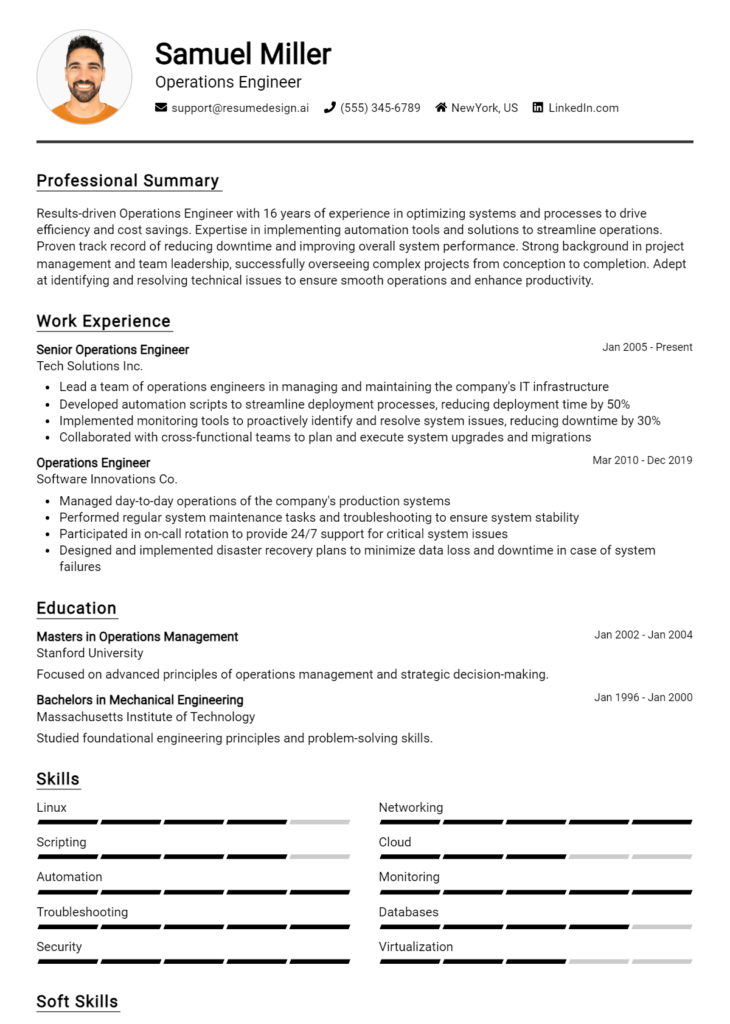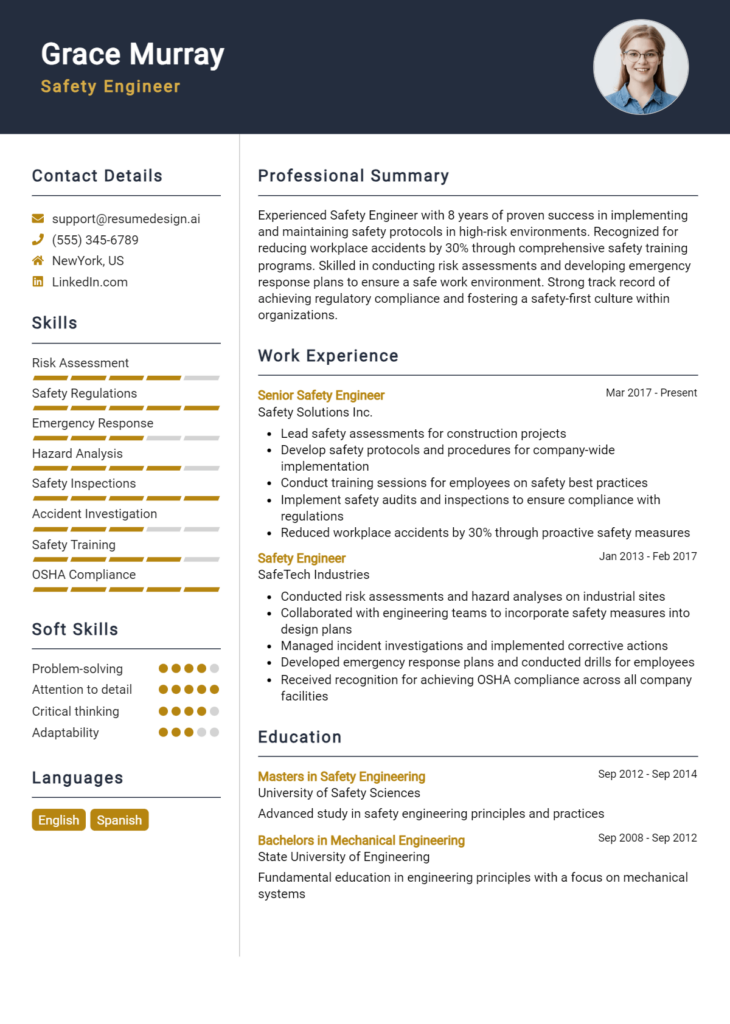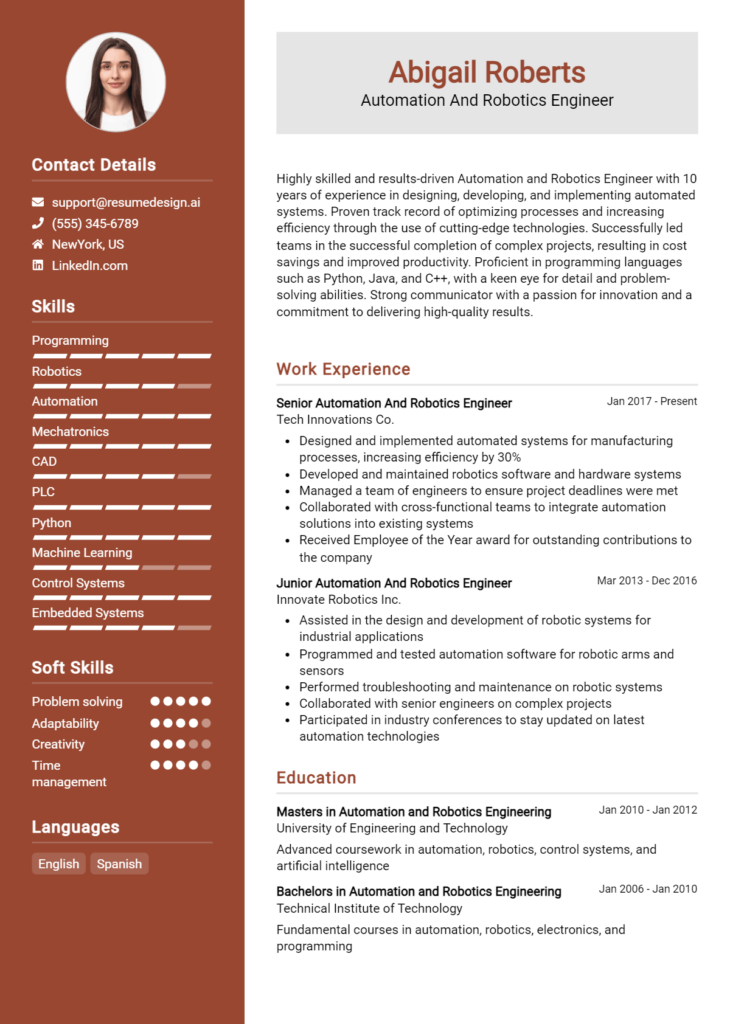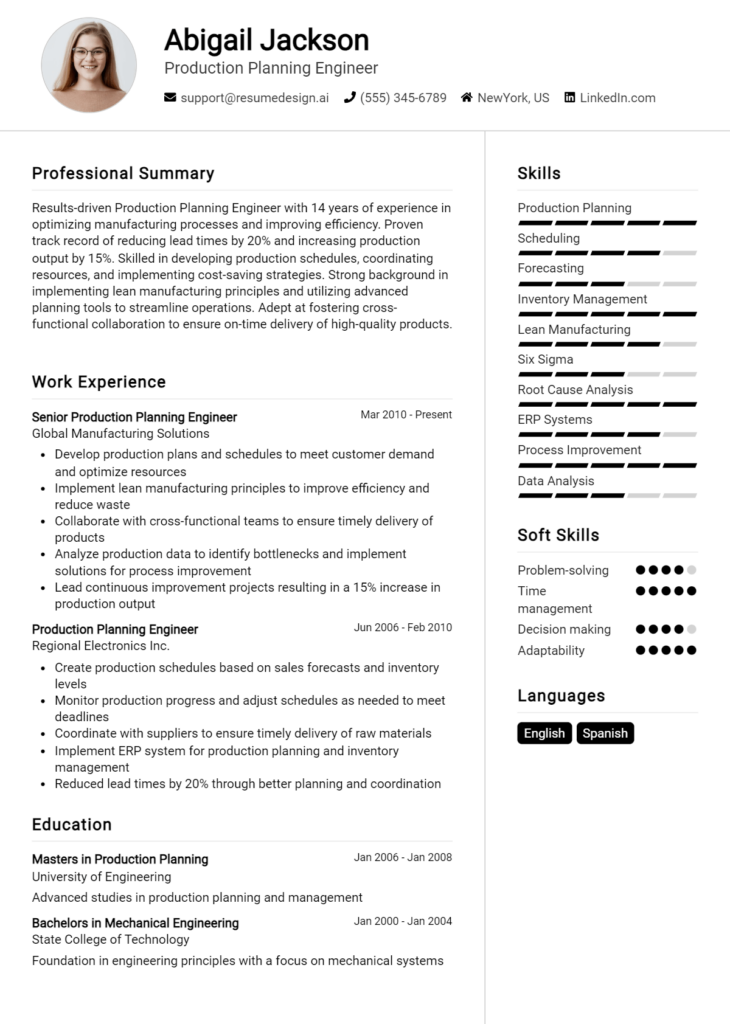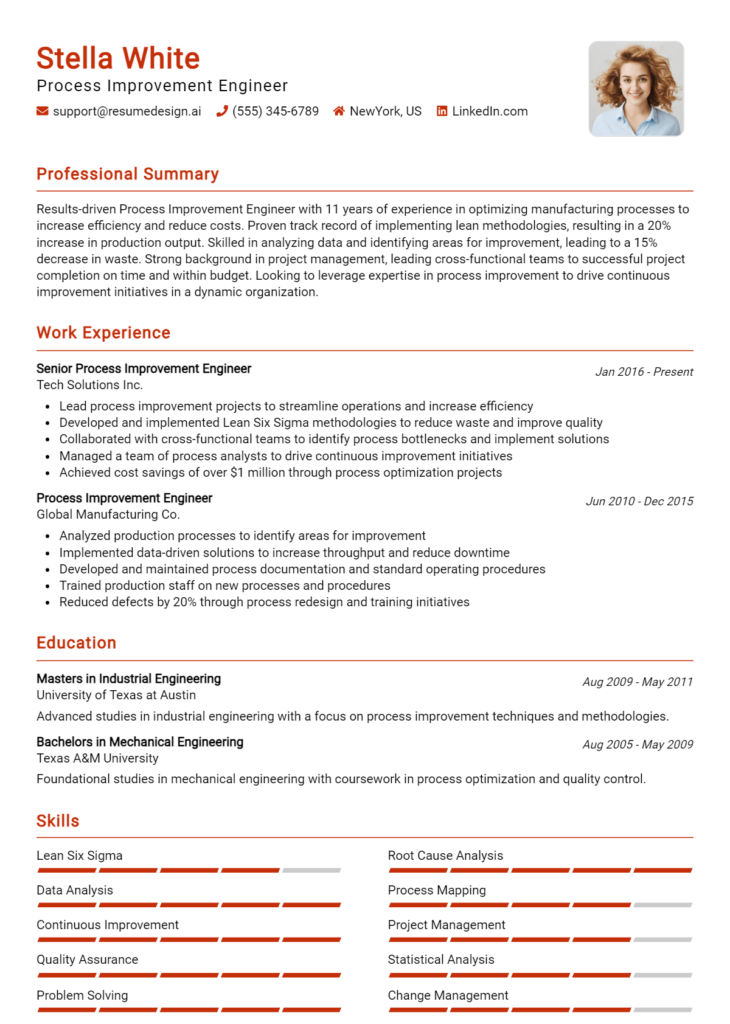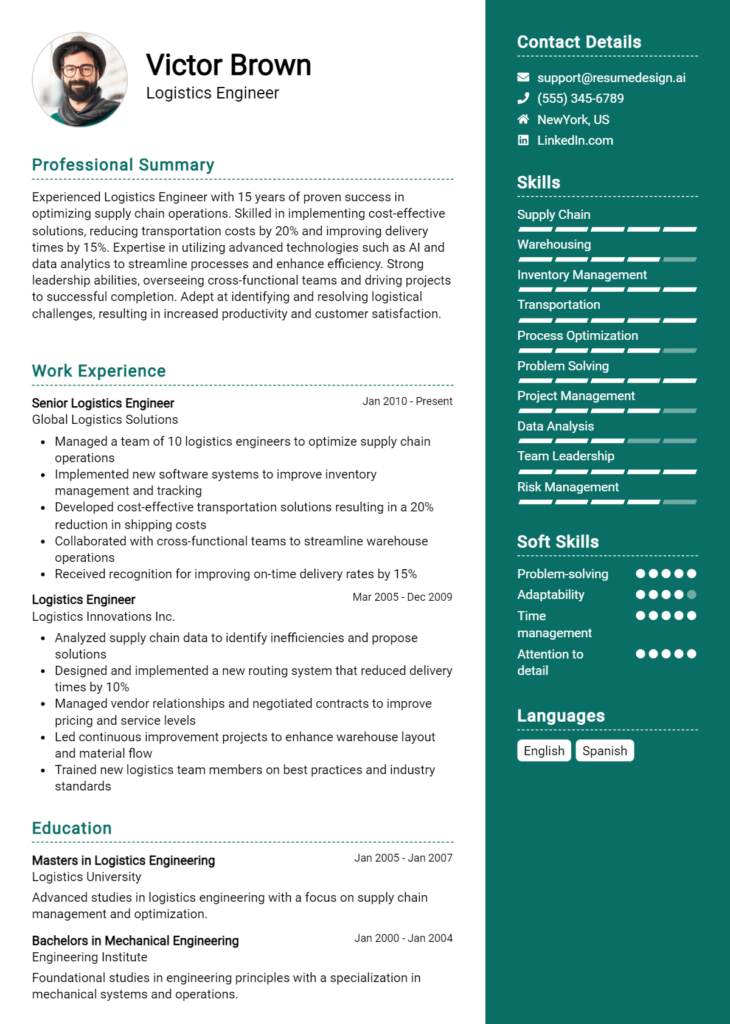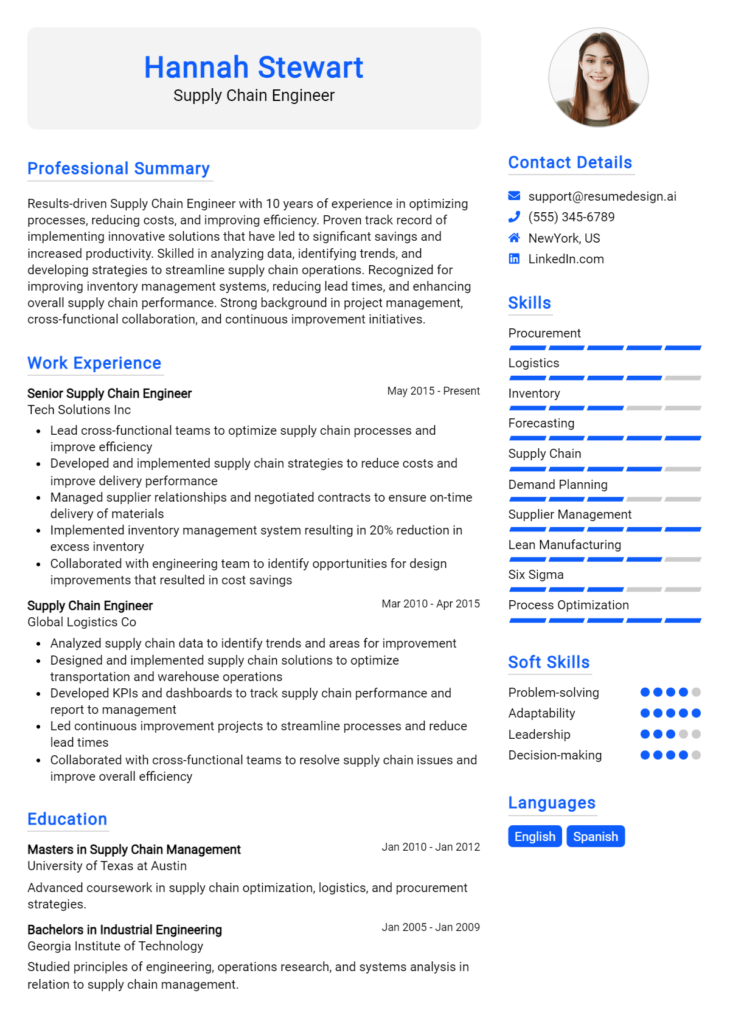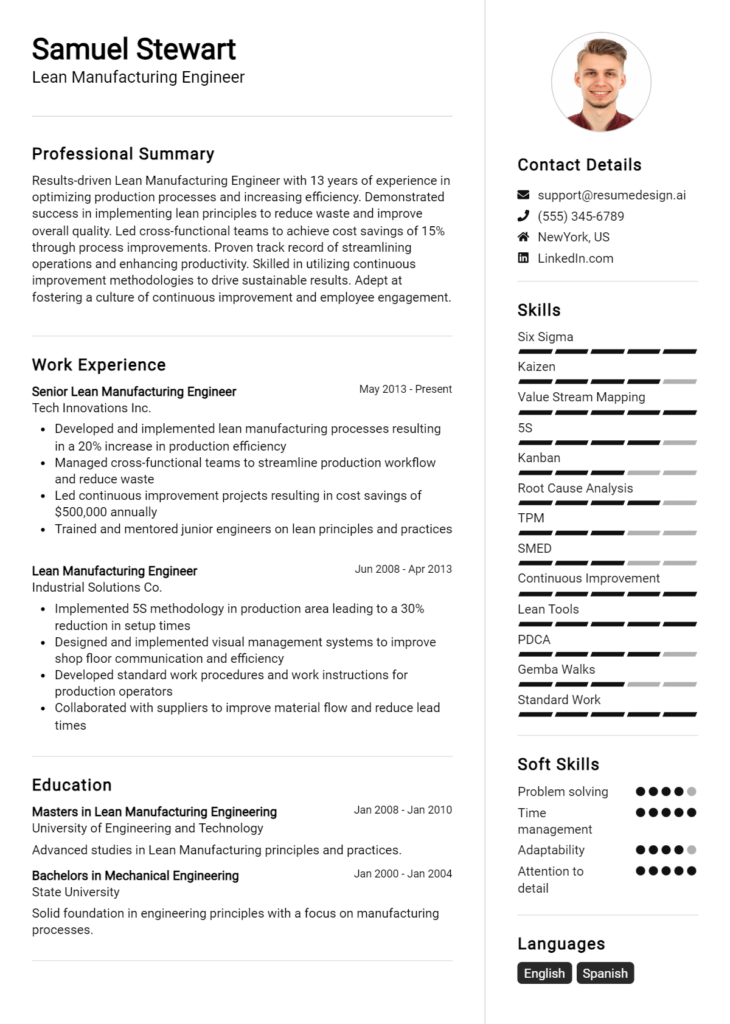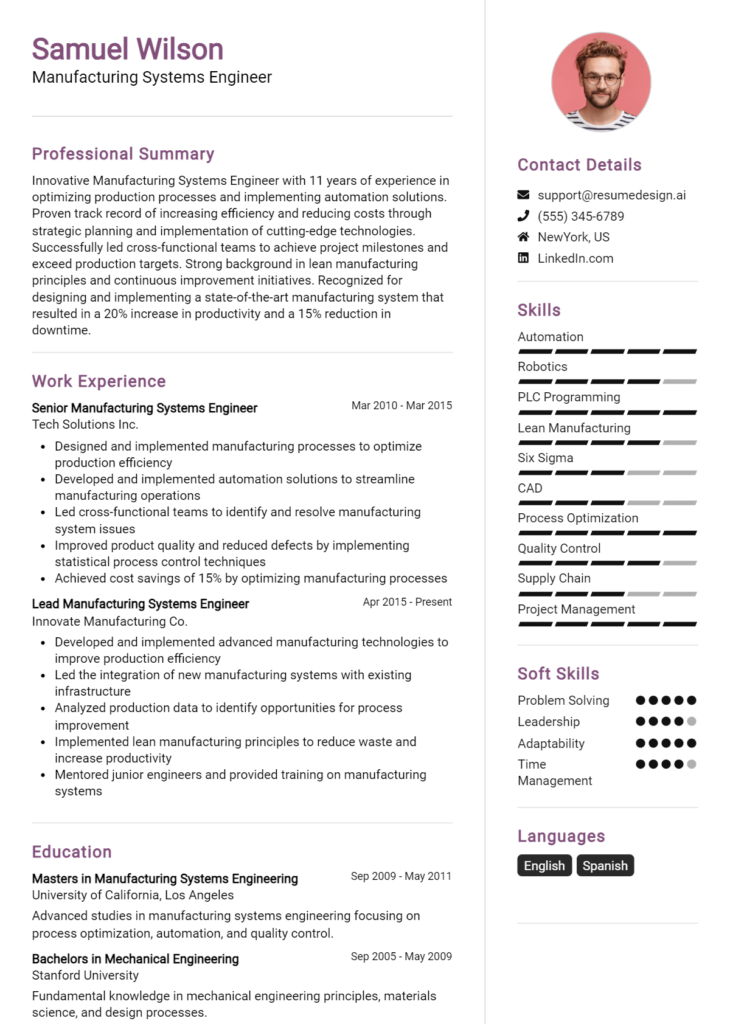Quality Engineer Core Responsibilities
A Quality Engineer plays a vital role in ensuring products meet high standards of quality and reliability. Their key responsibilities include developing quality assurance processes, conducting audits, and collaborating with cross-functional teams such as production, design, and supply chain. Essential skills encompass technical proficiency in quality tools, operational insight, and strong problem-solving abilities. These competencies are crucial in achieving organizational goals and enhancing customer satisfaction. A well-structured resume can effectively highlight these qualifications, showcasing the candidate's potential impact.
Common Responsibilities Listed on Quality Engineer Resume
- Develop and implement quality assurance protocols and procedures.
- Conduct regular audits and inspections of manufacturing processes.
- Analyze data to identify trends and areas for improvement.
- Collaborate with engineering and production teams to resolve quality issues.
- Develop testing plans and methodologies for product evaluation.
- Prepare reports on quality metrics and performance outcomes.
- Provide training and support to staff on quality standards.
- Ensure compliance with industry regulations and standards.
- Facilitate root cause analysis for product defects.
- Recommend corrective actions based on audit findings.
- Monitor supplier quality and manage vendor relationships.
- Participate in product design reviews to ensure quality considerations are met.
High-Level Resume Tips for Quality Engineer Professionals
In today's competitive job market, a well-crafted resume is essential for Quality Engineer professionals seeking to make a strong first impression on potential employers. Your resume is often the first point of contact between you and your next opportunity, making it crucial to reflect not only your skills but also your achievements in the field. A thoughtful and strategically designed resume can showcase your expertise in quality assurance, highlight your problem-solving abilities, and demonstrate your commitment to excellence. This guide will provide practical and actionable resume tips specifically tailored for Quality Engineer professionals, helping you stand out in a crowded applicant pool.
Top Resume Tips for Quality Engineer Professionals
- Tailor your resume to each job description by incorporating relevant keywords that match the requirements.
- Highlight your technical skills, such as proficiency in quality management systems, statistical analysis, and testing methodologies.
- Showcase relevant experience by detailing your roles in previous projects, emphasizing your contributions to quality improvement.
- Quantify your achievements by using metrics, such as percentage improvements in defect rates or reductions in cycle times.
- Include certifications related to quality engineering, such as Six Sigma or ASQ certifications, to bolster your qualifications.
- Emphasize your problem-solving skills by providing examples of how you identified issues and implemented effective solutions.
- Utilize a clean, professional format that enhances readability and allows key information to stand out.
- Incorporate soft skills, such as teamwork and communication, as they are essential for collaborating with cross-functional teams.
- Keep your resume concise, ideally one page long, focusing on the most relevant and impactful information.
- Proofread your resume meticulously to eliminate any errors, as attention to detail is a critical skill for quality engineers.
By implementing these tips, you can significantly increase your chances of landing a job in the Quality Engineer field. A tailored, well-organized resume that clearly showcases your skills and accomplishments will not only capture the attention of hiring managers but also position you as a strong candidate ready to contribute to their organization's success.
Why Resume Headlines & Titles are Important for Quality Engineer
In the competitive field of Quality Engineering, a well-crafted resume headline or title serves as a powerful tool for candidates to make a lasting first impression. A strong headline can immediately capture the attention of hiring managers, effectively summarizing a candidate's key qualifications in just a few impactful words. This concise statement should be relevant to the position being applied for, encapsulating the candidate's skills, experience, and unique value proposition. By providing a clear focus, a strong resume headline enables potential employers to quickly understand what the candidate brings to the table, enhancing their chances of being noticed in a crowded applicant pool.
Best Practices for Crafting Resume Headlines for Quality Engineer
- Keep it concise: Aim for a headline that is no longer than a single phrase or sentence.
- Be role-specific: Tailor your headline to reflect the specific position of Quality Engineer.
- Highlight key skills: Include essential qualifications or skills that align with the job description.
- Use impactful language: Choose strong action words or industry-specific terminology to convey expertise.
- Avoid jargon: Ensure the language is clear and understandable, avoiding overly technical terms that may confuse.
- Focus on results: If possible, mention quantifiable achievements or contributions made in previous roles.
- Be authentic: Reflect your true experience and qualifications without exaggeration or ambiguity.
- Update regularly: Revise your headline for each application to align with different job requirements.
Example Resume Headlines for Quality Engineer
Strong Resume Headlines
Detail-Oriented Quality Engineer with 5+ Years of Experience in Process Improvement
Certified Quality Engineer Specializing in Six Sigma Methodologies and Lean Practices
Results-Driven Quality Engineer Committed to Enhancing Product Quality and Reducing Defects
Weak Resume Headlines
Quality Engineer
Experienced Professional Seeking Job
The strong headlines are effective because they are specific, highlight relevant experience, and demonstrate a clear understanding of the role's requirements. They provide insight into the candidate's unique qualifications and accomplishments, making them memorable to hiring managers. In contrast, the weak headlines fail to capture attention due to their vagueness and lack of detail, leaving hiring managers with little to no information about the candidate's capabilities or potential fit for the position.
Writing an Exceptional Quality Engineer Resume Summary
A resume summary is a crucial component for a Quality Engineer, acting as a powerful introduction that can make or break a candidate's first impression. This brief yet impactful section allows professionals to quickly capture the attention of hiring managers by succinctly showcasing their key skills, relevant experience, and notable accomplishments in the field of quality assurance and engineering. A well-crafted summary should be concise, engaging, and tailored to the specific job description, ensuring that the candidate stands out in a competitive job market.
Best Practices for Writing a Quality Engineer Resume Summary
- Quantify Achievements: Use specific numbers and metrics to highlight your successes, such as percentage improvements or cost savings.
- Focus on Relevant Skills: Emphasize skills that are directly applicable to the Quality Engineer role, such as statistical analysis, process improvement, and risk management.
- Tailor for the Job Description: Customize your summary for each application, aligning your experience with the specific requirements and responsibilities outlined in the job posting.
- Highlight Certifications: Mention any relevant certifications, such as Six Sigma or ISO standards, that demonstrate your expertise in quality engineering.
- Use Action Verbs: Start sentences with dynamic action verbs to convey a proactive and results-oriented attitude.
- Keep it Concise: Aim for 3-5 sentences that deliver a clear message without overwhelming the reader.
- Showcase Soft Skills: Don’t forget to include important soft skills like teamwork, communication, and problem-solving that are essential for a Quality Engineer.
- Proofread: Ensure your summary is free of grammatical errors and typos to reflect your attention to detail.
Example Quality Engineer Resume Summaries
Strong Resume Summaries
Quality Engineer with over 5 years of experience in implementing process improvements that resulted in a 25% reduction in product defects. Proficient in utilizing statistical process control (SPC) and root cause analysis techniques to enhance quality systems.
Detail-oriented Quality Engineer with a proven track record of leading cross-functional teams to achieve ISO 9001 certification. Successfully reduced operational costs by 15% through effective quality management and compliance strategies.
Results-driven Quality Engineer with extensive knowledge in lean manufacturing principles and Six Sigma methodologies. Spearheaded a project that improved production efficiency by 30%, saving the company $200,000 annually.
Weak Resume Summaries
Experienced engineer looking for a quality position. I have worked in various industries and have some knowledge of quality processes.
Quality Engineer with skills in managing teams and improving processes. I am seeking a challenging role in a reputable company.
The examples of strong resume summaries are effective because they provide specific details about achievements, quantify results, and directly relate to the responsibilities of a Quality Engineer. In contrast, the weak summaries lack specificity and quantifiable outcomes, making them too generic and less compelling to potential employers. This highlights the significance of crafting a strong, tailored summary to enhance visibility and attractiveness in the competitive job landscape.
Work Experience Section for Quality Engineer Resume
The work experience section of a Quality Engineer resume is a critical component that serves as a testament to the candidate's technical proficiency and practical application of quality assurance principles. This section not only showcases the individual’s ability to manage teams and lead quality initiatives but also highlights their success in delivering high-quality products that meet or exceed industry standards. By quantifying achievements and aligning their experience with relevant metrics, candidates can effectively demonstrate their value to potential employers, making it clear how their skills can contribute to the organization's success.
Best Practices for Quality Engineer Work Experience
- Use action verbs to begin each bullet point, emphasizing your contributions.
- Quantify results whenever possible, such as percentage improvements or cost savings.
- Highlight specific technologies and methodologies you have mastered, such as Six Sigma or Agile.
- Showcase your role in team settings, emphasizing collaboration and leadership skills.
- Align your experiences with industry standards and certifications relevant to quality engineering.
- Include challenges faced and how you overcame them to demonstrate problem-solving skills.
- Tailor your work experience to fit the job description, emphasizing relevant experiences.
- Keep your descriptions concise and focused on results, avoiding overly technical jargon.
Example Work Experiences for Quality Engineer
Strong Experiences
- Led a cross-functional team to implement a quality control system that reduced defects by 30%, resulting in a $200,000 cost saving in the first year.
- Developed and executed a comprehensive testing strategy for a new product line, achieving a 95% customer satisfaction rate and a 20% increase in market share.
- Implemented Six Sigma methodologies that improved production efficiency by 25%, earning the team the "Best Quality Improvement Project" award.
Weak Experiences
- Worked on various projects related to quality engineering.
- Assisted in the quality assurance process for different products.
- Participated in team meetings to discuss quality issues.
The examples provided illustrate the stark contrast between strong and weak experiences. Strong experiences are characterized by specific, quantifiable outcomes that demonstrate the candidate's technical leadership and collaborative efforts. They provide measurable evidence of success and impact, making the candidate stand out. Conversely, weak experiences lack detail, specificity, and quantifiable results, failing to convey the candidate's capabilities or contributions in a meaningful way.
Education and Certifications Section for Quality Engineer Resume
The education and certifications section of a Quality Engineer resume is crucial as it serves as a testament to the candidate's academic background, professional training, and commitment to continuous learning. This section not only outlines the degrees obtained and relevant coursework completed but also showcases industry-recognized certifications that validate the candidate’s expertise in quality engineering principles and practices. By providing detailed information about specialized training and certifications, candidates can significantly enhance their credibility and demonstrate their alignment with the requirements and expectations of the job role, making them more competitive in the job market.
Best Practices for Quality Engineer Education and Certifications
- Include only relevant degrees and certifications that pertain to quality engineering or related fields.
- List certifications in order of relevance, highlighting those that are widely recognized in the industry.
- Provide details on any specialized training or coursework that pertains specifically to quality management systems or quality assurance methodologies.
- Use bullet points for clarity and to make the information easily scannable for hiring managers.
- Highlight advanced degrees or certifications, such as Six Sigma Black Belt or ASQ Certified Quality Engineer.
- Include the dates of completion for degrees and certifications to demonstrate currency in the field.
- Consider adding relevant honors or achievements related to your education or certifications.
- Keep the section concise and focused, avoiding clutter with unrelated educational experiences.
Example Education and Certifications for Quality Engineer
Strong Examples
- Bachelor of Science in Industrial Engineering, XYZ University, 2020
- Certified Quality Engineer (CQE), American Society for Quality (ASQ), 2021
- Six Sigma Green Belt Certification, 2022
- Relevant Coursework: Statistical Quality Control, Lean Manufacturing, Quality Management Systems
Weak Examples
- Associate Degree in General Studies, ABC Community College, 2018
- Certification in Microsoft Office Suite, 2019
- High School Diploma, 2016
- Online Course in Basic Photography, 2020
The strong examples are considered effective as they directly relate to the field of quality engineering, showcasing relevant degrees, certifications, and coursework that enhance the candidate's qualifications. In contrast, the weak examples lack relevance to the quality engineering role, featuring outdated or unrelated educational qualifications that do not align with industry standards or expectations, which could detract from the candidate's overall appeal to potential employers.
Top Skills & Keywords for Quality Engineer Resume
In the competitive field of quality engineering, a well-crafted resume is vital to showcase your expertise and value to potential employers. Highlighting relevant skills not only emphasizes your qualifications but also demonstrates your ability to contribute effectively to a team. Both hard and soft skills play critical roles in a Quality Engineer’s responsibilities, ensuring products meet stringent quality standards and enhancing overall efficiency in processes. By including a comprehensive list of your skills, you can align your experience with the expectations of hiring managers and increase your chances of landing an interview.
Top Hard & Soft Skills for Quality Engineer
Soft Skills
- Attention to Detail
- Problem-Solving
- Communication Skills
- Team Collaboration
- Adaptability
- Time Management
- Critical Thinking
- Leadership
- Conflict Resolution
- Analytical Thinking
- Interpersonal Skills
- Creativity
- Customer Focus
- Decision Making
- Negotiation Skills
- Emotional Intelligence
- Initiative
Hard Skills
- Quality Assurance (QA) Processes
- Statistical Process Control (SPC)
- Six Sigma Methodologies
- Root Cause Analysis (RCA)
- Failure Mode and Effects Analysis (FMEA)
- ISO Standards (ISO 9001, ISO 13485)
- Software Testing (Manual & Automated)
- Quality Management Systems (QMS)
- Data Analysis Tools (e.g., Minitab, Excel)
- Product Lifecycle Management (PLM)
- Inspection Techniques and Tools
- Regulatory Compliance Knowledge
- Lean Manufacturing Principles
- Test Planning and Execution
- Software Development Life Cycle (SDLC)
- Documentation and Reporting
- Risk Management
To further enhance your resume, consider integrating a detailed overview of your work experience and tailoring your skills to the specific job description. This focused approach can significantly elevate your candidacy in the quality engineering domain.
Stand Out with a Winning Quality Engineer Cover Letter
Dear Hiring Manager,
I am writing to express my interest in the Quality Engineer position at [Company Name], as advertised on [Job Board/Company Website]. With a solid background in quality assurance and a passion for ensuring product excellence, I am excited about the opportunity to contribute to your team. My experience in developing and implementing quality control processes, combined with my analytical skills and attention to detail, make me a strong candidate for this role.
In my previous role at [Previous Company Name], I successfully led a cross-functional team to improve product quality metrics by 30% within a year. By implementing robust testing protocols and conducting thorough root cause analyses, I was able to identify and rectify defects in the manufacturing process. My proficiency in quality management tools, including Six Sigma and Lean methodologies, has enabled me to streamline operations and enhance product reliability. I am particularly drawn to [Company Name] because of your commitment to innovation and quality, and I am eager to bring my skills in process improvement and risk assessment to your esteemed organization.
I believe that effective communication is key to success in quality engineering. Throughout my career, I have collaborated closely with engineering, production, and supply chain teams to foster a culture of quality and continuous improvement. My ability to convey technical information clearly has helped facilitate training sessions for staff on quality standards and practices, ensuring that every team member is aligned with our quality goals. I am enthusiastic about the prospect of working with the talented team at [Company Name] to drive quality initiatives and contribute to the delivery of outstanding products.
Thank you for considering my application. I am looking forward to the opportunity to discuss how my background, skills, and enthusiasms align with the needs of your team. I am eager to contribute to the ongoing success of [Company Name] and help maintain the high standards of quality that your customers expect.
Sincerely,
[Your Name]
[Your Phone Number]
[Your Email Address]
Common Mistakes to Avoid in a Quality Engineer Resume
Crafting a compelling resume as a Quality Engineer requires careful attention to detail and a clear presentation of skills and experiences. However, many candidates make common errors that can hinder their chances of landing an interview. Understanding these pitfalls can help you create a more effective resume that showcases your qualifications and aligns with industry expectations. Here are some common mistakes to avoid:
Generic Objective Statements: Using a vague objective that doesn't specify the role or your unique contributions can make you seem unfocused. Tailor your objective to reflect your specific career goals and how they align with the position.
Lack of Quantifiable Achievements: Failing to include metrics or specific examples of your contributions can make your resume less impactful. Use numbers and percentages to demonstrate your success in improving processes or reducing defects.
Ignoring Relevant Keywords: Many companies use Applicant Tracking Systems (ATS) to screen resumes. Not incorporating relevant keywords from the job description may result in your resume being overlooked. Analyze the job posting and include essential terminology.
Overloading with Technical Jargon: While industry-specific terminology is important, using excessive technical jargon can alienate hiring managers. Strike a balance by explaining technical concepts clearly and succinctly.
Inconsistent Formatting: A resume that lacks a professional format or has inconsistent fonts, sizes, and spacing can be distracting. Maintain a clean, uniform layout to enhance readability.
Neglecting Soft Skills: Focusing solely on technical skills without mentioning soft skills can paint an incomplete picture. Highlight abilities like communication, teamwork, and problem-solving that are crucial in a quality engineering role.
Listing Duties Instead of Accomplishments: Merely listing job duties can make your resume sound unremarkable. Instead, focus on accomplishments that demonstrate your impact in previous roles.
Not Tailoring for Each Application: Sending out a one-size-fits-all resume can lead to missed opportunities. Customize your resume for each job application to better align with the specific requirements and company culture.

